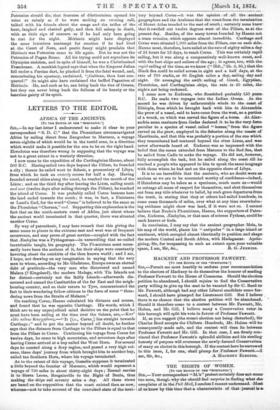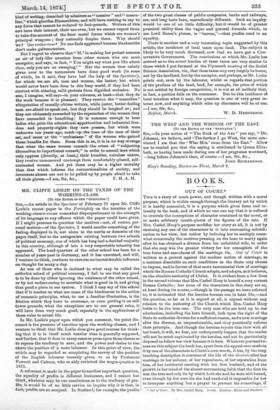THE RIGHTS OF WOMEN.
[To THE EDITOR OF THE "SPECTATOR-1
Sin,—Your correspondent "M.'s" protest certainly does not come- too soon, though why she should feel surprise in finding what she complains of in the Pall Mall,I confess I cannot understand. Most of us know by this time that a characteristic of that journal is et kind of writing, described by admirers as "massive " and" mascu- line," which glorifies Bismarckism, and will have nothing to say to any force that cannot be reduced to foot-pounds. Writers of this sort have their interest, their use even, but we cannot expect them to take due account of the finer moral forces which are women's principal weapons ; they naturally despise them. Why should we? Que voulez-vous? No one feels aggrieved because blacksmiths .don't make galvanometers.
But I regret to observe that " M." in making her protest assumes an air of lady-like aversion from other women who are more energetic, and says, in fact, "You might say what you like about these, only you are so sweeping!" But the women thus calmly given over to the tormentors have done good work (in some of which, be it said, they have had the help of the Spectator), for which we are all, men and women, the better, but which would never have been done in this busy world, if they had been content with uttering mild protests from dignified seclusion. No one, I imagine, will say—in your columns, at least—that they do the work because it is pleasant. They receive the " masculine" vituperation of morally-obtuse writers, while juster, better-feeling men are afraid to speak out, lest they should be laughed at ; and they are ultimately rewarded by the reproaches of the women they have succeeded in benefiting. It is common enough to hear ladies who prize the educational opportunities and industrial free- dom and property-rights they now possess, but which were unknown ten years ago, catch up the tone of the men of their set, and sneer at the " enthusiasm " of the women who gained these benefits for them. Since this is so, it is in no way strange that when the same women commit the crime of "subjecting themselves to impertinent remark," in order to amend laws which only oppress (directly, at least,) their humbler, voiceless sisters, they receive unmeasured contempt from comfortably-placed, self- .contented women. And yet there may be a higher morality than that which informs the conventionalities of society, and inveterate abuses are not to be pulled up by people afraid to take
off their gloves.—I am, Sir, &c., F. H. A. H.

































 Previous page
Previous page